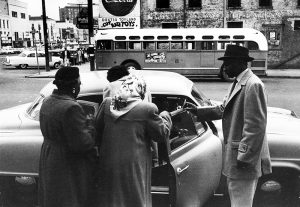
Photograph by Don Cravens/Time Life Pictures/Getty Images
A thorn in the side of Martin Luther King, Jr. in September of 1956 was… several auto insurance companies. From a letter that he wrote to Bayard Rustin that month:
We are still confronting pressure from reaction forces. For instance there is still the attempt to block our transportation system. The policies have been cancelled on more than half of our station wagons, and we have confronted insuperable difficulties trying to get them reinsured. You can see what it means to our transportation system to have about ten station wagons out of operation. We have had these station wagons out of operation for more than a week simply because they are not insured. This seems to be the major problem confronting us at this time.
Say what?
In order for the bus boycott in Montgomery, Alabama to be effective, African Americans need alternative transportation. A carpool was organized by the Montgomery Improvement Association, which was formed shortly after Rosa Parks refused to give up her seat. The MIA’s president? Martin Luther King, Jr.
In addition to private cars, local churches provided 22 station wagons for the carpool. Then as now, cars cannot be legally driven without insurance policies, and at one point the local insurance companies had cancelled the policies on 17 of the 22 station wagons. As King noted, the cancellations were done that the behest of the Montgomery White Citizens Council:
Formal objections to the car pool included the charges that the cars were improperly insured and the drivers were “morally unsuitable.” It is true that for a time some cars were without insurance—since the White Citizens Council brought pressure on the insurance companies to cancel the policies on cars being used in the pool. But this was remedied long before the court case, when Lloyds of London insured each car to the amount of $11,000. As evidence of the moral unfitness of the drivers, the city listed the numerous traffic tickets with which it had harassed us from the beginning. Despite this strange justice, we decided to comply with the court order.
Despite the rescue by Lloyds of London on the insurance front, the court order King refers to put the car pool out of commission on 13 November 1956 — the same day that the U.S. Supreme Court first struck down segregation on public transportation. So, they walked until the last appeal by the city was denied and bus service in Montgomery was desegregated on 21 December 1956.
Martin Luther King, Jr. had a dream, but that dream was not realized with a snap of the fingers or a single speech. Both segregation and the efforts to lift it involved many quotidian details. That’s my focus for today: few get the opportunity to stand in front of a microphone in front of a crowd of hundreds of thousands, but many, many more of influence in the realm of the small detail and can use that influence wisely… or poorly.
For further reading: the King Paper Publications at the The Martin Luther King, Jr. Research and Education Institute at Stanford, which has many writings by King available online — and not just the big speeches. Sometimes it’s good to look at the little ones, too.

